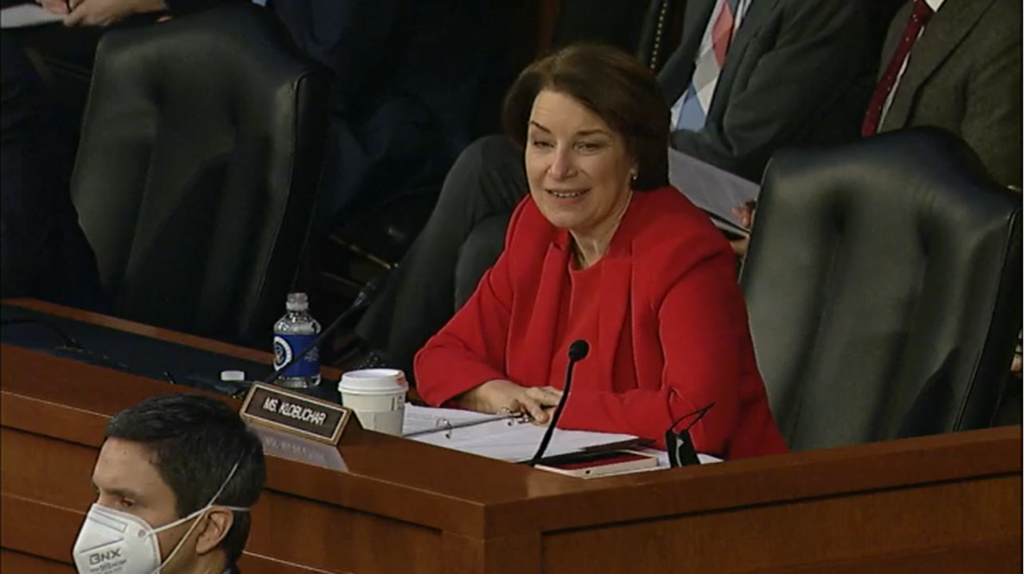American Innovation and Choice Online Act Advances to Senate Floor With Bipartisan Alliance
Klobuchar was able to rally Democrats and Republicans to support her bill, but its future depends upon a shaky alliance.

WASHINGTON, January 21, 2022 – Senators on the Senate Judiciary Committee have formed a tenuous, bipartisan alliance to curb allegedly anticompetitive behavior by large tech companies.
During a Thursday markup, the Senate Judiciary Committee voted 16-6 to send the American Innovation and Choice Online Act, S. 2992, to the Senate floor. The bill would prohibit certain companies with online platforms from engaging in behavior that discriminates against their competitors.
There is a laundry list of violations and unlawful behaviors enumerated in the bill, including unfairly preferencing products, limiting another business’ ability to operate on a platform, or discriminating against competing products and services.
This bill would only apply to companies with online platforms that meet one of the following criteria:
- Has at least 50,000,000 United States-based monthly active users on the online platform or 100,000 United States-based monthly active business users on the online platform
- Is owned or controlled by a person with United States net annual sales or a market capitalization greater than $550,000,000,000, adjusted for inflation on the basis of the Consumer Price Index and is a critical trading partner for the sale or provision of any product or service offered on or directly related to the online platform
Sen. Amy Klobuchar, D-Minn., the sponsor of the bill, referred to the bipartisan effort as “the Ocean’s 11 of co-sponsors,” featuring a diverse line-up of legislators, from Sen. Josh Hawley, R-Miss., and Sen. John Kennedy, R-La., to Sen. Dick Durban, D-Ill., and Sen. Richard Blumenthal, D-Conn.
Senators embrace specific and direct targeting of Big Tech
Klobuchar spoke directly about the need to target large companies, “We have to look at this differently that just startup in a garage – that is not what they are anymore. They may have started small, but they are [now] dominant platforms,” she said. “For the first time, the monopoly power is going to be challenged in what I consider to be a smart way.”
At the outset of the meeting, there were more than 100 amendments proposed by members of the committee, but by its conclusion, more than 80 of them had been withdrawn.
One of the amendments that worked its way into the bill was a markup that exempted subscription-based services from complying with the legislation, allowing services like Amazon Prime and Netflix to promote their own content above others’.
“The bill strikes the right balance between preventing the conduct that hurts competition, while also ensuring that platforms can continue to provide privacy and data security features to their users, compete against rivals in the United States and abroad, and maintain services that benefit consumers,” Klobuchar said.
A fragile alliance between read-meat Republicans and progressive Democrats
Though there were big names on both sides of the aisle supporting the bill, the alliance seemed fraught. Despite being supportive of the bill, Kennedy made it clear that his support was conditional. “I am a co-sponsor of this bill, but this bill is going to change – it is going to change dramatically,” he said. “I hope to be in the room when those changes are made, otherwise I will be off this bill faster than you can say ‘Big Tech.’”
Some of Kennedy’s criticisms harkened back to Section 230 issues raised by former President Donald Trump – calling some of the targeted companies “killing fields for the truth,” and stating that “their censorship is a threat to the first amendment.”
Despite his criticisms, Kennedy echoed other senators, both Republican and Democrat, who emphasized that they did not want the perfect to become the enemy of the good. “All we have done [for five years] is strut around, issue press releases, hold hearings, and do nothing. So, this is a start.”
Klobuchar also received push-back from members of her own party, with Sen. Dianne Feinstein, D-Calif., stating that she was critical of the bill because it is designed to specifically target large tech companies, many of which are based out of California (though she ultimately voted to advance the bill to the Senate floor).
Hawley rebuffed Feinstein in his comments, stating that he supports the bill for the same reason Feinstein refuses to. “[Feinstein] pointed out – I think rightly – that this bill is very specific and does target specific behavior – anti-competitive behavior – in a specific set of markets. I think that that’s a virtue and not a vice.”
The measure must be passed by the full Senate, as well as the House, before it goes to the president for his signature.








